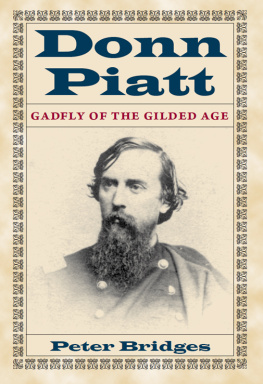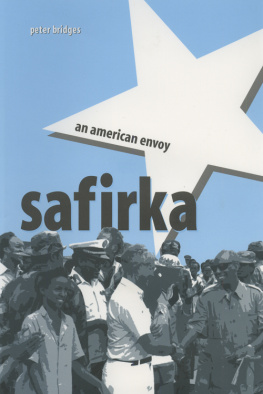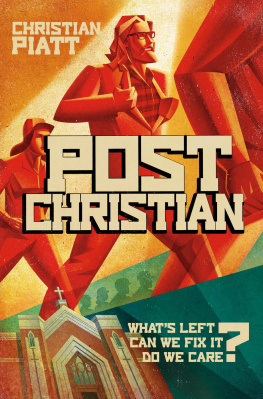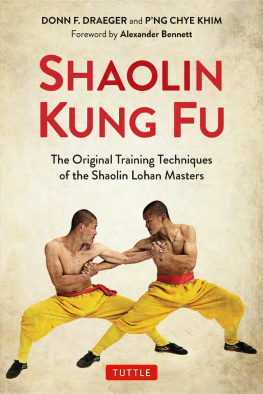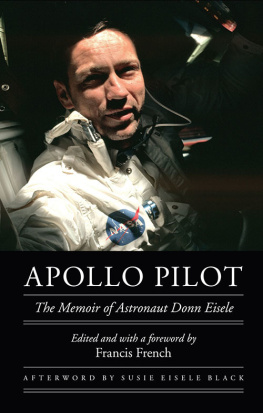Donn Piatt
ADST-DACOR DIPLOMATS AND DIPLOMACY SERIES
Series Editor: Margery Boichel Thompson
Since 1776, extraordinary men and women have represented the United States abroad under all sorts of circumstances. What they did and how and why they did it remain little known to their compatriots. In 1995 the Association for Diplomatic Studies and Training (ADST) and DACOR, an organization of foreign affairs professionals, created the Diplomats and Diplomacy book series to increase public knowledge and appreciation of the role of American diplomats in world history. The series seeks to demystify diplomacy through the stories of those who have conducted U.S. foreign relations, as they lived, influenced, and reported them. Donn Piatt: Gadfly of the Gilded Age by Peter Bridges, 48th volume in the series, recounts the life and times of a multifaceted public man and sometime diplomat in the booming decades of the late nineteenth century.
O THER T ITLES IN THE S ERIES
Gordon S. Brown, Toussaints Clause: The Founding Fathers and the Haitian Revolution
Herman J. Cohen, Intervening in Africa: Superpower Peacemaking in a Troubled Continent
Charles T. Cross, Born a Foreigner: A Memoir of the American Presence in Asia
Brandon Grove, Behind Embassy Walls: The Life and Times of an American Diplomat
Parker T. Hart, Saudi Arabia and the United States: Birth of a Security Partnership
Edmund Hull, High-Value Target: Countering Al Qaeda in Yemen
Dennis Kux, The United States and Pakistan, 19472000: Disenchanted Allies
Jane C. Loeffler, The Architecture of Diplomacy: Building Americas Embassies
Terry McNamara, Escape with Honor: My Last Hours in Vietnam
William B. Milam, Bangladesh and Pakistan: Flirting with Failure in Muslim South Asia
Robert H. Miller, Vietnam and Beyond: a Diplomats Cold War Education
Ronald E. Neumann, The Other War: Winning and Losing in Afghanistan
David D. Newsome, Witness to a Changing World
Richard B. Parker, Uncle Sam in Barbary: A Diplomatic History
Nicholas Platt, China Boys: How U.S. Relations with the PRC Began and Grew
Howard B. Schaeffer, Ellsworth Bunker: Global Troubleshooter, Vietnam Hawk
James W. Spain, In Those Days: A Diplomat Remembers
James Stephenson, Losing the Golden Hour: An Insiders View of Iraqs Reconstruction
Ulrich Straus, The Anguish of Surrender: Japanese POWs of World War I
Jean Wilkowski, Abroad for Her Country: Tales of a Pioneer Woman Ambassador in the U.S. Foreign Service
DONN PIATT
Gadfly of the Gilded Age
P ETER B RIDGES
The Kent State University Press
Kent, Ohio
ADST-DACOR Diplomats and Diplomacy Series
2012 by The Kent State University Press, Kent, Ohio 44242
ALL RIGHTS RESERVED
Library of Congress Catalog Card Number 2012013502
ISBN 978-1-60635-116-1
Manufactured in the United States of America
LIBRARY OF CONGRESS CATALOGING-IN-PUBLICATION DATA
Bridges, Peter, 1932
Donn Piatt : gadfly of the Gilded Age / Peter Bridges.
p. cm. (ADST-DACOR diplomats and diplomacy series)
Includes bibliographical references and index.
ISBN 978-1-60635-116-1 (hardcover : alk. paper)
1. Piatt, Donn, 18191891. 2. StatesmenUnited StatesHistory19th centuryBiography. 3. JournalistsUnited StatesBiography. 4. United StatesHistory19th century. 5. OhioBiography. I. Title.
F496.P58B75 2012
070.92dc23
[B]
2012013502
16 15 14 13 12 5 4 3 2 1
For our grandchildren
Amanda, Peter, Devlin,
Gigi, Penny, and Roland
with hope that during their lives
the words of Shelley may come true:
The worlds great age begins anew,
The golden years return....
Who shall speak for the people?
who has the answers?
where is the sure interpreter?
who knows what to say?
Carl Sandburg
The man who has no enemies has no following.
Donn Piatt
CONTENTS
ACKNOWLEDGMENTS
I am indebted to many people for the help they have given me with this book. I am deeply grateful to the Kent State University Press and its director, Will Underwood, for agreeing for a third time to publish a work of mine. Joyce Harrison, the acquisitions editor of the Press, has been unfailingly helpful and, beyond that, good natured, no matter how many complications were offered her by a dour and sometimes forgetful fellow. I am equally grateful to managing editor Mary Young and marketing manager Susan Cash for their kind help and applied wisdom.
I owe a great debt to Margaret Piatt and Jim White of the Piatt Castles for opening to me both the Castles and their rich (and well-ordered) archives. As I sat there many days in an upstairs room, going over letters, poems, scrapbooks, and the very books that young Donn had read, I felt sure I was coming closer to a vanished age. (Incidentally, spelling and capitalization of these houses names have varied over the years, and even Donn Piatt was not consistent. Originally, the whole property was known as Mac-o-cheek. Today the two so-called Castles are Mac-O-Chee and Mac-A-Cheek.)
Daniel W. Crofts of the College of New Jersey read an early draft and pointed out a number of gross errors I had made. John W. Hubbell, professor emeritus of Kent State University and former director of its press, whom I hope I may call not just friend but mentor, read two later drafts and called my attention to a number of mistakes and lacunae. I also profited greatly from the comments, both critical and careful, made by the presss two anonymous academic readers.
I have written previously that I believe archivists and librarians to be one of the best classes of human beings. My work on this book has reconfirmed this belief. Every request I made of an archive or library was promptly answered, and some people went out of their way to help me. Lynda Lasswell Crist, editor and project director of the Papers of Jefferson Davis at Rice University, located for me a number of letters exchanged between Piatt and the old Confederate president that I would otherwise never have found. Kristina Eleyet, president of the Logan County, Ohio, Genealogical Society, worked late on the only day I could spend in Bellefontaine to find for me the surviving court records dealing with Piatt. Jane Thomas and Bob Puglisi of the Old Rock Library in Crested Butte, Colorado, made it possible for me to receive many old volumes on interlibrary loan in a small mountain town. Dale Flick, librarian of the Cincinnati Literary Club, pored through the old club archives to find the warm letter Piatt sent to the club president in 1890. Nan Card, the curator of manuscripts in the Rutherford B. Hayes Presidential Center in Fremont, Ohio, spent much time locating for me all the correspondence relating to Piatt and his friend the president. John P. Richardson kindly shared with me a number of press articles relating to Piatt that he had come across during his own research on Alexander Shepherd. The staff of the Library of Congress, and particularly the people of the Manuscript Division, continued the kind help I began to receive from them a decade or more ago.
Not least, I am grateful to my wife, Mary Jane, for hearing me out when, so many times, I needed to share something about Piatt and his contemporaries, and for urging me so many times to keep in mind the need to produce a book that was not only accurate but readable.


